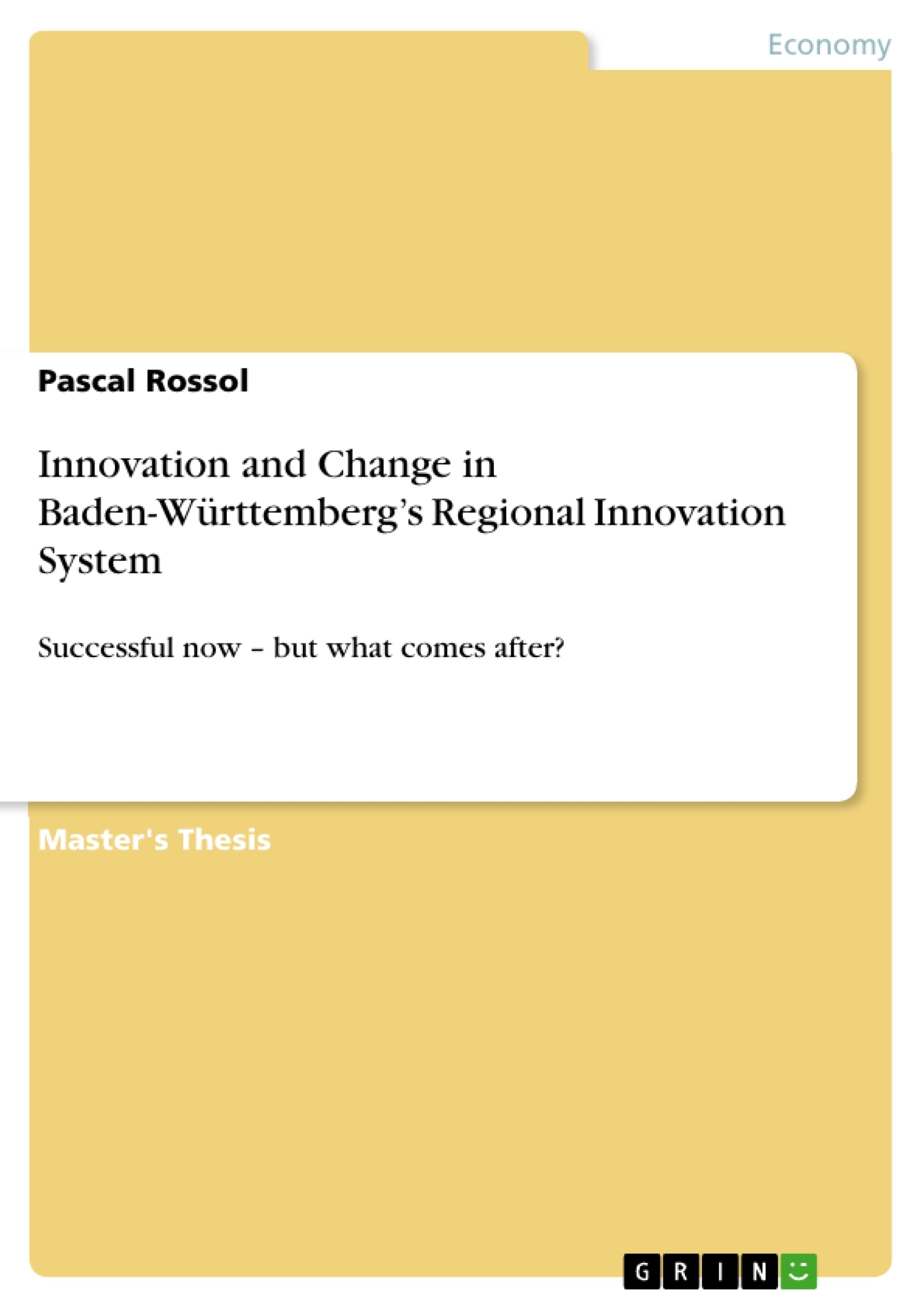Globalization pushed regions on the market of global competition. Each of them tries to fulfill the needs of companies, tries to surround all actors with a reliable innovation system, tailored to the needs of their economy. The federal state of Baden-Württemberg (BW) in Germany is one of them. BW has been in the focus for its outstanding performance in the sectors of mature industries in the past. Nowadays the former successful region has to adapt to the sectors of high-technologies. Several concepts, such as RIS, lock-in, pathdependency, variety and specialization, are applied to the region to see how it has changed. It is questioned if BW was able to avoid stagnation and lock-in in the past and if it transformed its regional innovation system to a higher level. Surprisingly, the results show that BW was indeed able to fulfill the needs of high-tech sectors to a certain degree by further engaging R&D, and transforming the educational base.
Key Words: Regional Innovation Systems, Baden-Württemberg, mature industries, hightechnology
sectors
Inhaltsverzeichnis (Table of Contents)
- INTRODUCTION
- PURPOSE AND SIGNIFICANCE
- RESEARCH SCOPE AND RESEARCH QUESTION
- METHODOLOGY
- STRUCTURE OF THE THESIS
- CONCEPTUAL FRAMEWORK AND LITERATURE REVIEW
- INTRODUCTION
- REGIONAL INNOVATION SYSTEMS (RIS) IN THE LITERATURE
- Introduction
- Regional Innovation Systems
- THE CONCEPTS OF LOCK-IN AND PATH-DEPENDENCY
- Lock-in and Path-Dependency at a Glance
- THE CONCEPTS OF VARIETY AND SPECIALIZATION
- Introduction
- Variety vs. Specialization
- CASE STUDY AND ANALYSIS
- INTRODUCTION
- THE REGION OF BADEN-WÜRTTEMBERG, GERMANY
- BW at a Glance
- BW's "traditional" economy
- BW's Regional Innovation System
- Changing Regions - What happened to BW?
- CONCLUSION
- FINDINGS
- LIMITATIONS
- FURTHER RESEARCH
Zielsetzung und Themenschwerpunkte (Objectives and Key Themes)
This thesis examines the regional innovation system (RIS) of Baden-Württemberg (BW) in Germany, analyzing its transformation from a focus on mature industries to high-technology sectors. The study seeks to understand the region's ability to adapt to evolving economic demands and avoid stagnation.- The impact of globalization on regional innovation systems.
- The role of concepts such as RIS, lock-in, path-dependency, variety, and specialization in understanding regional development.
- The evolution of BW's innovation system from traditional industries to high-technology sectors.
- The significance of R&D investments and educational transformation in fostering technological advancement.
- Analyzing the success of BW in adapting to changing economic demands.
Zusammenfassung der Kapitel (Chapter Summaries)
This preview will focus on the main themes and arguments presented in each chapter, excluding the conclusion and final chapter.- Introduction: This chapter introduces the purpose and significance of the research. It outlines the research scope, research question, methodology, and structure of the thesis. The importance of understanding the adaptive capabilities of regional innovation systems, particularly in light of globalization, is highlighted.
- Conceptual Framework and Literature Review: This chapter delves into the theoretical underpinnings of the study, exploring relevant concepts and literature pertaining to regional innovation systems. Key concepts such as regional innovation systems (RIS), lock-in, path-dependency, variety, and specialization are discussed, providing a foundational understanding of the theoretical framework.
- Case Study and Analysis: This chapter focuses on the specific case study of Baden-Württemberg (BW) in Germany. It provides an overview of BW's economic characteristics, its "traditional" economy, and its regional innovation system. The chapter analyzes the region's historical context, its transformation from mature industries to high-technology sectors, and the factors contributing to this change.
Schlüsselwörter (Keywords)
This thesis explores the transformation of regional innovation systems in a globalized economy. Key concepts include Regional Innovation Systems (RIS), lock-in, path-dependency, variety, and specialization, which are applied to the analysis of Baden-Württemberg (BW), a region known for its successful transition from mature industries to high-technology sectors. The study examines the importance of R&D investments and educational transformation in driving this transition.Frequently Asked Questions
What is a Regional Innovation System (RIS)?
A RIS is a framework of actors and institutions in a region that support the generation, diffusion, and application of knowledge and innovation.
How did Baden-Württemberg adapt to high-tech sectors?
The region successfully shifted from mature industries by increasing R&D investments and transforming its educational base to meet new technological demands.
What are "lock-in" and "path-dependency"?
These concepts describe how a region's historical focus on specific industries can lead to stagnation or difficulty in switching to new economic paths.
Why is variety important for a regional economy?
Economic variety allows a region to be more resilient against sector-specific crises and fosters cross-sectoral innovation.
Did Baden-Württemberg avoid stagnation?
The thesis concludes that BW was able to avoid typical lock-in effects by evolving its innovation system to accommodate high-technology sectors.
- Quote paper
- Pascal Rossol (Author), 2008, Innovation and Change in Baden-Württemberg’s Regional Innovation System, Munich, GRIN Verlag, https://www.grin.com/document/149842



